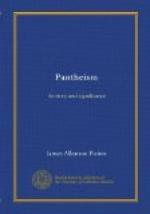Yet, when we come to contemplate the final and supreme object of devotion, the Eternal Himself, it has been almost the universal custom to make a surprising exception, and to regard religion as maintainable only by recognition of a tremendous outward authority, to which only such loyalty is possible as in barbarous times was fostered towards a personal chieftain, or feudal king. Now Pantheism holds this to be an error, and regards obedience and devotion to God as the ultimate and most inspiring application of that principle of the loyalty of the part to the whole which runs through all morality.
[Sidenote: Conclusion.]
Why should we be supposed to be without God because we acknowledge Him to be superpersonal, and “past finding out”? Or why should we be suspected of denying the divinity of evolution because we do not believe the Eternal All to be subject to it? This instinct of loyalty, in the sense of self-subordination to any greater Whole of which we are part, the distinction of right and wrong thence arising, and the aspiration after a moral ideal, are not of man’s invention. Speaking, as we cannot help doing, in terms of time, I hold that the germs of this higher creature-life were always in the divine unity out of which man is evolved. And in pursuing the inspirations of that higher life, as experience suggests them, humanity has always had a guide and a saviour in the Living God, of whom the race life-time of man is an infinitesimal phase. In such an interpretation of man’s relations to God there is nothing necessarily hostile to any form of genuine religion.[24] True, there are in the creeds many statements which we cannot accept in the letter. But there are few which have not some spiritual suggestion for us. And if we can attain to that intellectual love of God in which Spinoza was absorbed, we have no quarrel with any mode of sincere devotion. Pious Catholic, Protestant, Vedantist, Mohammedan—all, by the implicit, though unrecognised necessities of their faith, worship the same God as ourselves. But the wrangles of sectarian zeal no longer concern us: for we have passed
“To where beyond those voices there is peace.”
FOOTNOTES:
[Footnote 22: Quoted by Dr. J. Hunt, in his Essay on Pantheism, p. 312.]
[Footnote 23: See The Religion of the Universe, pp. 128-30.]
[Footnote 24: Limitations of space must be my apology for reference to an enlargement of this topic in “A Pantheistic Sermon” at the end of The Religion of the Universe.]



